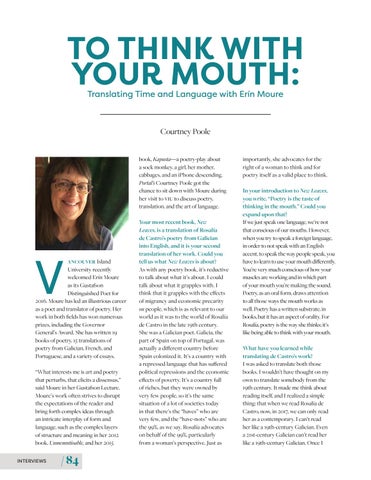TO THINK WITH YOUR MOUTH: Translating Time and Language with Erín Moure
Courtney Poole book, Kapusta—a poetry-play about a sock monkey, a girl, her mother, cabbages, and an iPhone descending. Portal’s Courtney Poole got the chance to sit down with Moure during her visit to viu to discuss poetry, translation, and the art of language.
V
ancouver Island University recently welcomed Erín Moure as its Gustafson Distinguished Poet for 2016. Moure has led an illustrious career as a poet and translator of poetry. Her work in both fields has won numerous prizes, including the Governor General’s Award. She has written 19 books of poetry, 15 translations of poetry from Galician, French, and Portuguese, and a variety of essays. “What interests me is art and poetry that perturbs, that elicits a dissensus,” said Moure in her Gustafson Lecture. Moure’s work often strives to disrupt the expectations of the reader and bring forth complex ideas through an intricate interplay of form and language, such as the complex layers of structure and meaning in her 2012 book, Unmemntioable, and her 2015
INTERVIEWS
/ 84
Your most recent book, New Leaves, is a translation of Rosalía de Castro’s poetry from Galician into English, and it is your second translation of her work. Could you tell us what New Leaves is about? As with any poetry book, it’s reductive to talk about what it’s about. I could talk about what it grapples with. I think that it grapples with the effects of migrancy and economic precarity on people, which is as relevant to our world as it was to the world of Rosalía de Castro in the late 19th century. She was a Galician poet. Galicia, the part of Spain on top of Portugal, was actually a different country before Spain colonized it. It’s a country with a repressed language that has suffered political repressions and the economic effects of poverty. It’s a country full of riches, but they were owned by very few people, so it’s the same situation of a lot of societies today in that there’s the “haves” who are very few, and the “have-nots” who are the 99%, as we say. Rosalía advocates on behalf of the 99%, particularly from a woman’s perspective. Just as
importantly, she advocates for the right of a woman to think and for poetry itself as a valid place to think. In your introduction to New Leaves, you write, “Poetry is the taste of thinking in the mouth.” Could you expand upon that? If we just speak one language, we’re not that conscious of our mouths. However, when you try to speak a foreign language, in order to not speak with an English accent, to speak the way people speak, you have to learn to use your mouth differently. You’re very much conscious of how your muscles are working and in which part of your mouth you’re making the sound. Poetry, as an oral form, draws attention to all those ways the mouth works as well. Poetry has a written substrate, in books, but it has an aspect of orality. For Rosalía, poetry is the way she thinks; it’s like being able to think with your mouth. What have you learned while translating de Castro’s work? I was asked to translate both those books. I wouldn’t have thought on my own to translate somebody from the 19th century. It made me think about reading itself, and I realized a simple thing: that when we read Rosalía de Castro, now, in 2017, we can only read her as a contemporary. I can’t read her like a 19th-century Galician. Even a 21st-century Galician can’t read her like a 19th-century Galician. Once I
